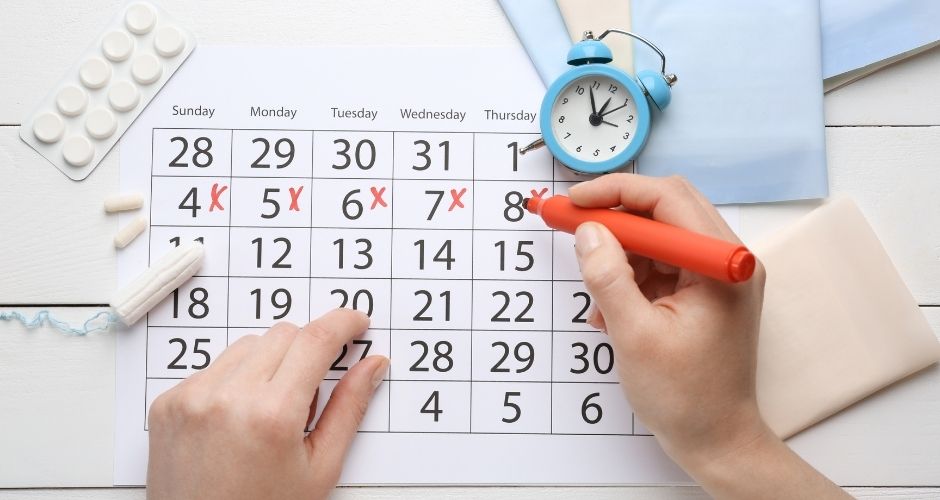11 Reasons Why Your Period Is Late

A late period can cause a surge of emotions – confusion, anxiety, relief, or even excitement – depending on your circumstances. While pregnancy is often the first thought, it’s far from the only explanation. There are many reasons why your menstrual cycle might get thrown off, and understanding them can help reduce stress and guide your next steps.
This article explores 11 common reasons for a delayed period, explaining the science behind each one. At the end, you’ll find a Frequently Asked Questions (FAQ) section to address common concerns and actionable tips on when to see a doctor.
Understanding the Menstrual Cycle
Before diving into the reasons for a late period, it’s helpful to understand the basics of the menstrual cycle. A typical menstrual cycle lasts 28 days, though it can range between 21 to 35 days for many women. The cycle is regulated by hormones, primarily estrogen and progesterone, and consists of several phases:
- Menstrual Phase: Shedding of the uterine lining (your period)
- Follicular Phase: Egg development
- Ovulation: Release of a mature egg
- Luteal Phase: Uterine lining thickens in preparation for pregnancy
A disruption at any point can delay your period

1. Pregnancy
The Most Common Reason
If you’re sexually active and your period is late, pregnancy is the most common reason. When a fertilized egg implants into the uterine wall, it stops your body from shedding the lining – meaning no period.
What To Do
Take a home pregnancy test if you’re even slightly at risk. Blood tests from a healthcare provider are even more accurate.
2. Stress
How Stress Affects Your Cycle
High stress levels – whether from work, relationships, school, or health issues – can impact the hypothalamus, the part of the brain that regulates your hormones. This can disrupt ovulation and delay or skip your period.
Signs
- Changes in appetite
- Trouble sleeping
- Feeling overwhelmed
Tip
Practice stress-reducing activities like yoga, meditation, exercise, or journaling.
3. Polycystic Ovary Syndrome (PCOS)
A Hormonal Imbalance
PCOS is a condition that affects hormone levels, often leading to irregular or missed periods. It also causes small cysts on the ovaries and may lead to excess facial hair, acne, or weight gain.
What Happens?
Higher levels of androgens (male hormones) interfere with ovulation, making periods unpredictable or absent.
What To Do
See a doctor for blood tests and ultrasounds. PCOS is treatable with lifestyle changes, birth control, or hormone therapy.
4. Weight Changes
Both Weight Gain and Loss Matter
Significant changes in body weight can affect your hormonal balance. Rapid weight loss, eating disorders, or obesity can delay ovulation and menstruation.
Why?
Body fat helps regulate estrogen. Too little or too much fat disrupts hormone levels, throwing your cycle off balance.
Tip
Maintain a healthy weight through balanced eating and regular exercise.
Give a look – 11 Signs Your Period is Coming Tomorrow
5. Excessive Exercise
Especially in Athletes
Intense physical activity, especially without adequate nutrition, can lead to hypothalamic amenorrhea, where the brain slows hormone production to conserve energy.
Who’s at Risk?
- Professional athletes
- Dancers
- Women training for marathons or bodybuilding
Solution
Scale back intense training and consult a sports nutritionist or doctor.
6. Thyroid Issues
A Tiny Gland With Big Impact
The thyroid gland controls metabolism and affects your menstrual cycle. Both hypothyroidism (underactive) and hyperthyroidism (overactive) can cause period irregularities.
Symptoms
- Fatigue
- Hair thinning
- Weight changes
- Feeling too cold or hot
What To Do
Blood tests can detect thyroid problems. Treatment often involves medication to normalize hormone levels.
7. Birth Control and Other Medications
Why Your Pill Could Delay Periods
Hormonal contraceptives like the pill, patch, injection, IUD, or implant can alter your cycle. Some may even stop your period altogether.
Other Medications
Drugs for antidepressants, chemotherapy, blood pressure, or allergy can also affect menstruation.
Solution
If concerned, discuss side effects with your doctor. Changing methods or dosages can help.
Recommended – Period Mistakes That Every Girl Should Avoid
8. Perimenopause
The Transition to Menopause
Women typically enter perimenopause in their 40s (sometimes earlier), which causes fluctuations in hormone levels. This stage can last years before menopause is officially diagnosed (after 12 months without a period).
Signs
- Hot flashes
- Mood swings
- Vaginal dryness
- Sleep problems
What To Do
Talk to a gynecologist about hormone therapy or natural supplements for symptom relief.
9. Chronic Illness or Medical Conditions
Your Health Affects Your Hormones
Conditions like diabetes, celiac disease, autoimmune disorders, or even prolonged fevers and infections can throw your cycle off.
Why It Happens
Your body prioritizes healing over reproduction during chronic illness, altering hormone levels.
Tip
Managing the root condition can restore your normal menstrual rhythm.
10. Travel or Time Zone Changes
Disrupted Biological Clock
Jet lag or travel, especially across multiple time zones, can mess with your body’s circadian rhythm, which also influences hormone production.
Other Causes
Changes in sleep, diet, stress, and environmental factors while traveling can also play a role.
Solution
Give your body a few days to adjust. If your period is still late after a week, consider testing for pregnancy or tracking ovulation.
11. Breastfeeding
Natural Hormone Changes
Prolactin, the hormone responsible for milk production, suppresses ovulation. Many breastfeeding women experience delayed or absent periods, especially in the first 6 months postpartum.
Is It Normal?
Yes. It’s called lactational amenorrhea and is completely natural.
What To Expect
Periods typically return once breastfeeding is reduced or stopped.
When Should You Worry?
While an occasional late period is usually harmless, you should contact a healthcare provider if:
- Your period is more than 2 weeks late
- You miss three or more cycles in a row
- You experience severe pain or heavy bleeding when it returns
- You have other symptoms like hair loss, vision changes, or unusual discharge
FAQs: Late Periods Answered
1. Can I miss a period and not be pregnant?
Yes. Stress, illness, hormone imbalances, and lifestyle changes can all delay your period even if you’re not pregnant.
2. How late is considered “late” for a period?
Anything more than 5–7 days late from your expected cycle can be considered delayed.
3. Is it normal to have an irregular period sometimes?
Yes. Most women experience an irregular period at some point due to changes in health, weight, stress, or other temporary factors.
4. Can I get my period and still be pregnant?
Not exactly. Some women experience implantation bleeding or light spotting in early pregnancy, but it’s not a true period.
5. Should I track my periods?
Absolutely. Tracking your menstrual cycle helps identify irregularities early and provides useful data for medical consultations.
6. Can dehydration delay your period?
Not directly, but dehydration can cause stress in the body, which may affect your cycle indirectly.
Final Thoughts
A late period doesn’t always mean something is wrong – but it shouldn’t be ignored either. Your menstrual cycle is a reflection of your overall health. If your period is consistently late or you notice other symptoms, it may be time to consult a healthcare provider.
Remember: Every woman is different. What’s normal for one person might not be normal for you. Understanding your body, staying informed, and seeking medical guidance when necessary can help you stay on top of your reproductive health.






